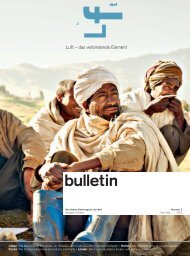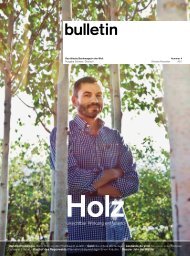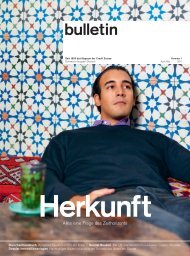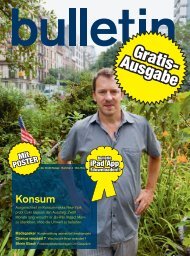Healthcare
Entering the digital era Global Investor, 02/2012 Credit Suisse
Entering the digital era
Global Investor, 02/2012
Credit Suisse
- No tags were found...
Create successful ePaper yourself
Turn your PDF publications into a flip-book with our unique Google optimized e-Paper software.
GLOBAL INVESTOR 2.12 — 45<br />
“My ultimate aim is to encourage<br />
<br />
<br />
small businesses.”<br />
fresh vegetables. These came from a sheltered<br />
farm workshop that was founded in<br />
1994 for about 160 workers with psychiatric<br />
disabilities. We called it “simulated business”<br />
because it was intended to resemble as<br />
closely as possible a real work situation in<br />
which persons with psychiatric disabilities<br />
could interact with regular customers. We<br />
provided a job coach to help the former patients<br />
to be salespeople. The project was well<br />
received by both neighboring stall owners and<br />
customers. This successful effort led to us<br />
setting up convenience stores in hospitals<br />
from 1997. Three years earlier, we secured a<br />
public cleaning contract in parks and the city’s<br />
indoor games hall and in 1999 also the first<br />
licensed restaurant in the games hall. These<br />
projects won numerous awards for best practices<br />
in reintegration. After witnessing the<br />
impressive results of providing training and<br />
employment opportunities for persons with<br />
psychiatric disabilities in these projects, the<br />
government subsequently set up a fund to<br />
provide seed money to social enterprises.<br />
Balancing objectives the key to success<br />
Social enterprise has two main objectives.<br />
One, obviously, is social, and in my own experience,<br />
it consists in training and employment<br />
opportunities for persons with a history<br />
of mental illness. The other objective is to<br />
sustain a business with profits generated and<br />
to use the surplus to create other new social<br />
enterprises or to expand the existing one. The<br />
directors of this limited company do not share<br />
in the profits. Balancing social and business<br />
objectives is more difficult than running a<br />
business with profit sharing, as the two objectives<br />
are entirely different. Sometimes, the<br />
managers focused more on the social objective,<br />
and the enterprise failed to produce<br />
sufficient income (neither the directors nor<br />
the managers were former patients). It is<br />
the combination of both types of expertise –<br />
understanding the social objective and marketing<br />
savvy – that makes it a success. I was<br />
fortunate to have recruited a team of marketing<br />
staff to assist me in running the businesses,<br />
and a team of dedicated social workers<br />
to deliver on the social objective.<br />
In response to the growing awareness of<br />
healthy food after the 2003 SARS (severe<br />
acute respiratory syndrome) epidemic, in 2004<br />
I began to set up healthy-living specialty<br />
organic shops that sold organic veggies (again<br />
from the sheltered organic farm) in the railway<br />
concourse, followed by four more shops later.<br />
As of 2009, we had established a total of<br />
20 social enterprises, providing more than<br />
230 jobs for persons with psychiatric disabi l-<br />
ities, the disadvantaged and the able-bodied,<br />
and simultaneously creating over 450 training<br />
positions with a total turnover of over HKD 25<br />
million that yielded a small profit.<br />
A model that others are following<br />
Responding to the success of social enterprises<br />
in Hong Kong, our mainland China<br />
counterparts made numerous study visits to<br />
Hong Kong to learn about this approach to<br />
the disadvantaged. I am glad to say that<br />
Guangzhou City also set up a farm to provide<br />
both employment and training opportunities<br />
to persons with psychiatric disabilities, and<br />
a mental hospital in Xinjiang set up a similar<br />
farm. Ever since my retirement in 2009, I have<br />
traveled widely to different provinces and<br />
cities of mainland China to deliver talks on my<br />
previous working experience, and I encourage<br />
colleagues to come to Hong Kong to see how<br />
we do things. This sort of exchange serves<br />
to show visitors that people with a history of<br />
mental illness can recover and hold down a<br />
job like anyone else.<br />
Naturally, social enterprises run by nonprofit<br />
welfare organizations are limited; they<br />
are “models” of best practice. My ultimate aim<br />
is to encourage business firms to partner<br />
with non-profit organizations to set up actual<br />
small businesses that employ persons with<br />
disabilities or to set up social enterprises<br />
within their own firms. Such an endeavor<br />
represents more than just corporate social<br />
responsibility; it is a commitment to plough<br />
back profits into a company to create employment<br />
positions for the disadvantaged. That<br />
is my vision, and I am optimistic that others<br />
will share it. I am now seeing more young<br />
entrepreneurs enter the field of social enterprise<br />
with financial support from social ventures<br />
providing seed money.<br />
Social entrepreneurship has to be nurtured,<br />
and optimally during young people’s<br />
years at university. I have seen social entrepreneurship<br />
being taken up by various business<br />
schools at Hong Kong’s universities, but<br />
the field still has a long way to go. Since the<br />
enactment of the United Nations Convention<br />
on the Rights of Persons with Disabilities in<br />
2008, the interest of governments in this<br />
area has been growing. Every effort should<br />
be made to provide jobs through social enterprises.<br />
I do hope that more young social<br />
entrepreneurs will decide to go into business

















